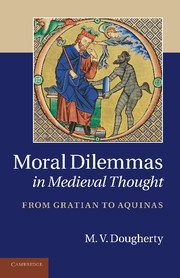Book contents
- Frontmatter
- Contents
- Preface
- Introduction
- 1 Gratian and his glossators on conflicts in the natural law
- 2 Twenty moral dilemmas from two early thirteenth-century summaries of theology: William of Auxerre's Summa aurea and the Franciscan Summa Halesiana
- 3 Raymond Lull and moral ensnarement in the Vita coaetanea
- 4 Thomas Aquinas, moral dilemmas, and a missing article from Quodlibet XII
- 5 Thomas Aquinas on failures of practical reasoning: Why synderesis doesn't inoculate agents against malformed conscience dilemmas
- 6 Moral dilemmas in the early Thomistic tradition: Johannes Capreolus and the Deceiving Demon Dilemma
- Conclusion
- Bibliography
- Index
Conclusion
Published online by Cambridge University Press: 03 May 2011
- Frontmatter
- Contents
- Preface
- Introduction
- 1 Gratian and his glossators on conflicts in the natural law
- 2 Twenty moral dilemmas from two early thirteenth-century summaries of theology: William of Auxerre's Summa aurea and the Franciscan Summa Halesiana
- 3 Raymond Lull and moral ensnarement in the Vita coaetanea
- 4 Thomas Aquinas, moral dilemmas, and a missing article from Quodlibet XII
- 5 Thomas Aquinas on failures of practical reasoning: Why synderesis doesn't inoculate agents against malformed conscience dilemmas
- 6 Moral dilemmas in the early Thomistic tradition: Johannes Capreolus and the Deceiving Demon Dilemma
- Conclusion
- Bibliography
- Index
Summary
The systematic investigation of whether moral dilemmas exist is often seen as an achievement of modern or contemporary philosophy, but it is in medieval philosophy that the subject is first substantively analyzed. The narrative here has offered a sampling of these medieval debates, and along the way the principle of the lesser evil has emerged as central to these discussions. The foremost defenders of the existence of moral dilemmas in the Middle Ages invoked the principle as a guide for action, arguing that agents should strive to minimize wrongdoing when its complete avoidance is impossible. Counted among the defenders of both the existence of moral dilemmas and the permissibility of the principle of the lesser evil are some of the great thinkers of the medieval period, including Gratian, William of Auxerre, and the Franciscan authors of the Summa Halesiana, among others. Throughout these debates, the authority of Gregory the Great was evident, as he continued to cast a long shadow throughout discussions of moral dilemmas even to the time of Capreolus in the fifteenth century.
Not all medieval moral theorists were promoters of moral dilemmas, however. The glossators on Gratian's Decretum denied their existence, offering arguments similar to Aquinas's later denial of situations of perplexity simpliciter. Absent from Aquinas's presentation, however, was the glossators' forceful assertion that dilemmas are simply illusory and merely the result of the foolishness of moral agents. Aquinas's most distinctive contribution to medieval moral dilemma theory was his strict separation of innocent-agent dilemmas from prior-fault dilemmas.
- Type
- Chapter
- Information
- Moral Dilemmas in Medieval ThoughtFrom Gratian to Aquinas, pp. 198 - 203Publisher: Cambridge University PressPrint publication year: 2011



